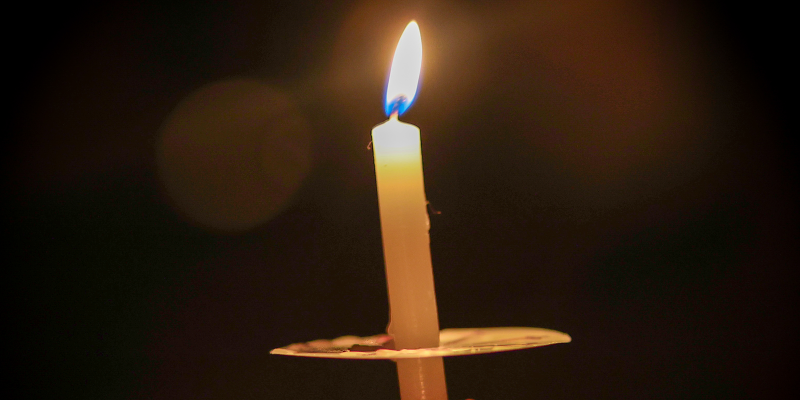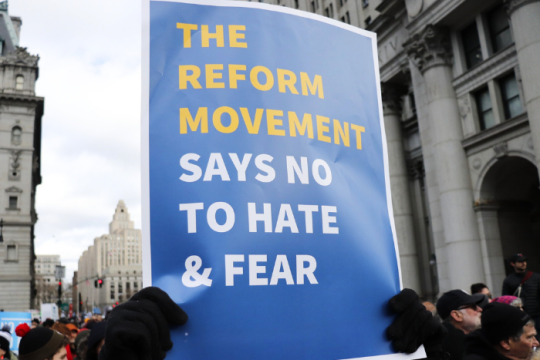
As antisemitic incidents increase, the Union for Reform Judaism and Religious Action Center continue to work for the safety and security of our communities. We have joined with the Anti-Defamation League, the world’s leading anti-hate organization, in the creation of a multi-faceted partnership.
- Download the Commission on Social Action of Reform Judaism Resource: Addressing Antisemitism at the Local Government Level. This resource includes guidance on addressing antisemitic actions, resolutions, and initiatives from local governmental entities, including city, town, and county councils, as well as school boards. Whether your local community is confronting an antisemitic incident now, or preparing should one arise in the future, this resource helps guide you on organizing your efforts effectively, consistent with Reform Jewish values.
- Download "Responding to Antisemitic Incidents: A Resource for URJ Communities," a toolkit for both congregations and individuals to effectively respond to acts of antisemitism and hate in their communities.
- Read Rabbi Josh Weinberg's "How to Respond to Antisemitic or Anti-Israel Posts Online" published October 2023. We have seen several deeply troubling posts on social media that are antisemitic, anti-Israel, and/or contain misinformation or disinformation. While this is not a complete guide, we hope it will help guide you in responding.
- Report incidents of antisemitism, extremism, bias, bigotry or hate. Incidents reported through this form will be reviewed by the URJ and ADL, and both organizations may follow up when appropriate to provide assistance.
- Explore Prayers for Strength and Healing.
- Learn if your state requires Holocaust and genocide education. Research suggests a direct relationship between deficiencies in Holocaust education and heightened prejudicial, antisemitic beliefs.
Why Should Jews Care?
In the Holiness Code, in Leviticus, we are commanded both that "You shall not hate your kinsfolk in your heart. Reprove your kinsman but incur no guilt because of him. You shall not take vengeance or bear a grudge against your countrymen. Love your fellow as yourself" (Leviticus 19:17-18) and that "You may not stand idly by when your neighbor's blood is being shed." (Leviticus 19:16)
We are also taught, in the very beginning of the Torah, that "God created man in God's own image, in the image of God () God created him; male and female God created them" (Genesis 1:27). Judaism consistently teaches the importance of tolerance and the acceptance of others, even those different from ourselves. Even more than simply preaching tolerance, we must actively work to improve, open, and make safer our communities.
TAKE ACTION
Pray Safe Act
Across the United States, houses of worship and other religious institutions face an alarming level of violence. Religious institutions must be able to access the necessary resources to ensure their institutions remain safe and welcoming to all. Urge your members of Congress to support the bipartisan Pray Safe Act to establish a federal clearinghouse through which faith-based organizations and houses of worship can access safety resources.
Countering Antisemitism Act
Addressing the growing threat of antisemitism is imperative and requires immediate, direct action. Tell your representatives to support the bipartisan Countering Antisemitism Act to strengthen federal efforts to counter antisemitism in the United States, including by establishing the position of a National Coordinator to Counter Antisemitism to chair an interagency task force.
Mandatory Hate Crime Reporting
Every data point is an individual harmed and a community impacted, and accurate hate crime data is vital to meet the crisis of hate in the United States. Congress must mandate reporting to support affected communities and prevent future hate crimes, including antisemitism. Tell your representatives to support the bipartisan Improving Reporting to Prevent Hate Act!
What's New

Five Definitions of Antisemitism
How We’re Helping Build Coalitions to Lead the Fight Against Antisemitism
Related Press Releases
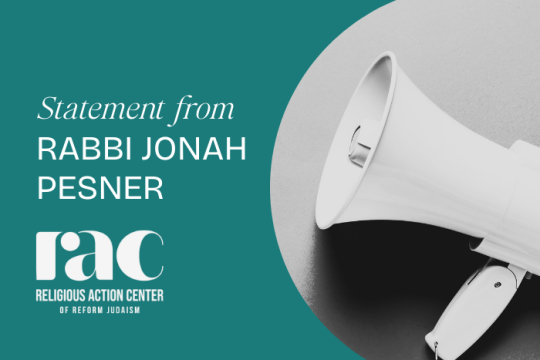
Rabbi Jonah Pesner Responds to U.S. Coast Guard Decision on Swastika Classification
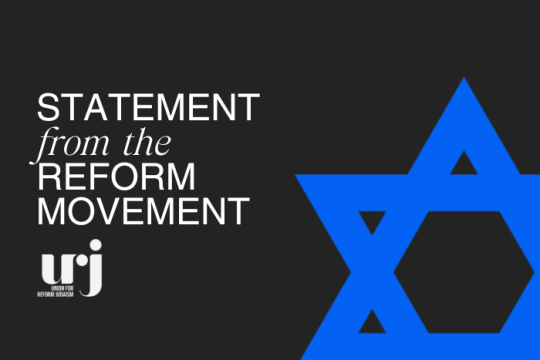
Reform Jewish Leaders’ Statement on the Anti-Zionist Protest at New York’s Park East Synagogue

Letter to National Education Association
Related Issues
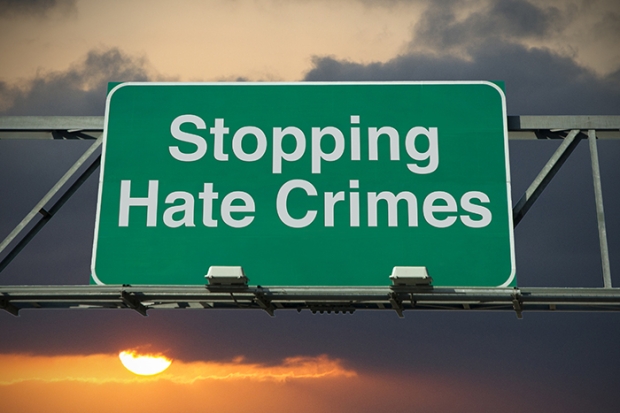
Hate Crimes
While hate crime laws cannot eliminate bigotry, legislation serves as a deterrent to those individuals who choose to act on their hatred by imposing stricter penalties against the perpetrators of these crimes.
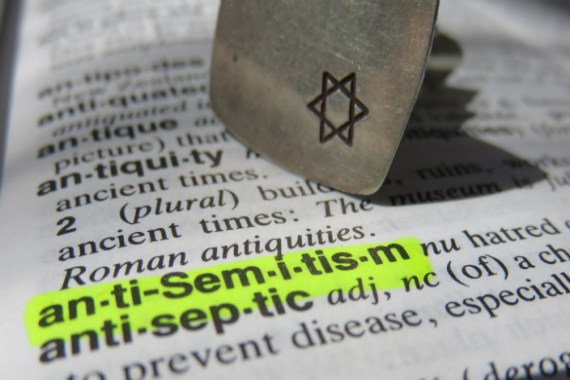
Modern Day Issues in Antisemitism
Antisemitism is on the rise in North America and around the world, showcased in the annual ADL’s Audit of Anti-Semitic Acts. Violent attacks on Jewish institutions and Jews are also increasing.
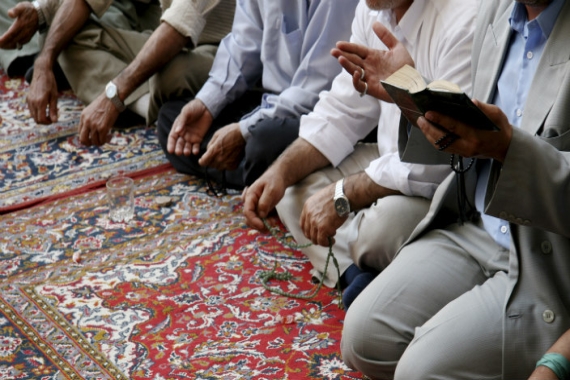
Standing With our Muslim Family
Bias and violence against the Muslim community is a growing, insidious issue in the United States. The number of assaults against Muslims in 2016 surpassed the modern peak reached in 2001, following the September 11th terrorist attacks, and incidents of anti-Muslim intimidation continue to rise, as well.

Reform Judaism's Resolutions on Anti-Semitism and Hate Crimes
Learn more about the position of the Reform Movement on these key issues, and read the formal resolutions by URJ and CCAR.
Responding to Antisemitic Incidents: A New Resource for URJ Communities
Contact our Legislative Assistants
For more information on this issue, contact Liana Smolover-Bord.
What Our Partners Are Doing
- Anti-Defamation League
- American Jewish Committee
- Matthew Shepard Foundation
- Lawyers Committee for Civil Rights Under the Law
- Human Rights Campaign
- NAACP Legal Defense Fund
- The Sikh Coalition
- Hindu American Foundation
- Southern Poverty Law Center
- People for the American Way
- U.S. Holocaust Memorial Museum
- Shoulder2Shoulder
Sign Up For RAC Emails
Learn more about the RAC's key issues and get involved by signing up for the legislative updates newsletter.
